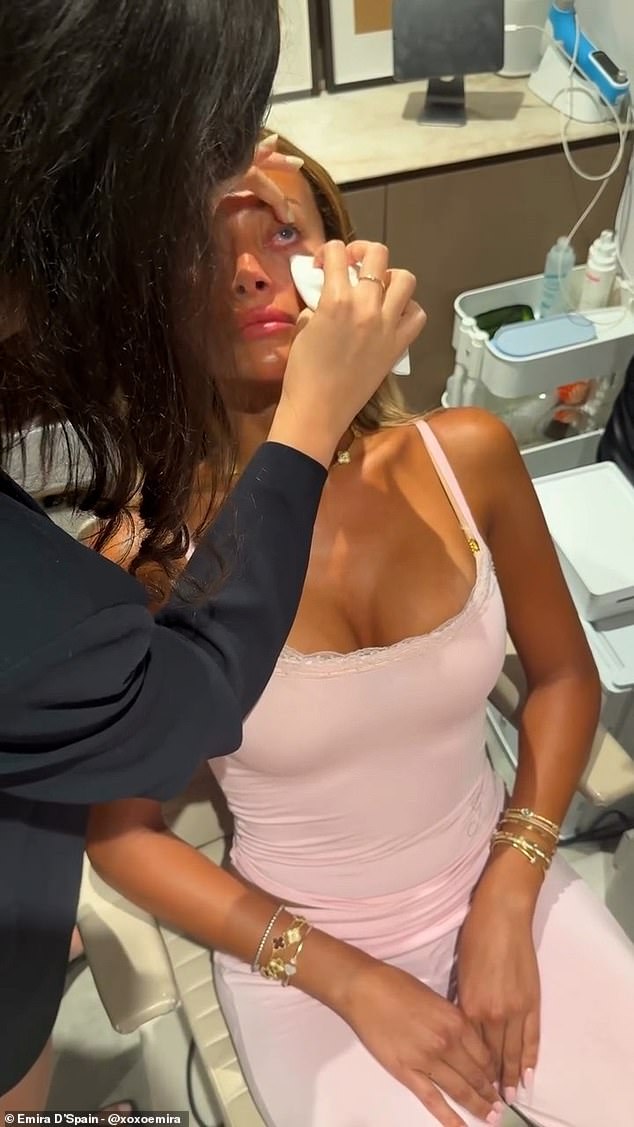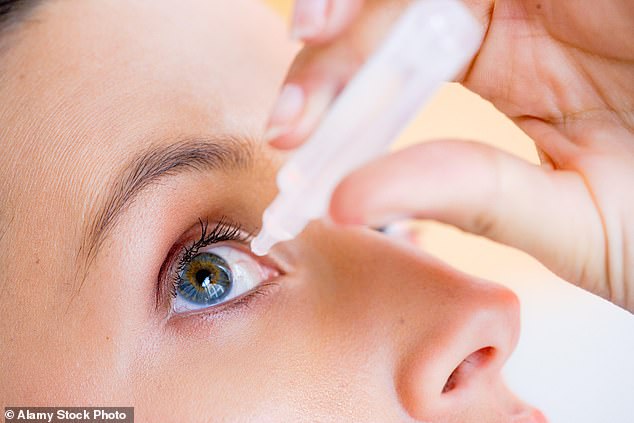Published: | Updated:
A beauty influencer has raved about a bizarre cosmetic treatment which involves wearing placenta lenses to brighten and treat her dry eyes.
Emira D’Spain, 28, a US-based model and reality TV star from Dallas, had struggled with dry eyes—a common condition where the eyes do not produce enough tears—for years.
So when her doctor suggested Prokera, Ms D’Spain leapt at the opportunity.
Prokera is a treatment in which involves a ‘bandage’ made from the amniotic membrane of a donated human placenta being placed upon the eyeball.
The makers of the $2,000 (£1,500) treatment—which is not currently available in the UK—claim that the amniotic membrane is rich in biologically active components that help soothe dry eyes, and help scratched or damaged eyeballs heal.
In an Instagram video explaining the procedure, she said: ‘I had placenta put in my eye and it was the best thing I have ever done.
‘I have struggled with dry eye for the longest time ever and it was so bad it created these microtears in the bottom of my eye.’
Whilst many people will experience dry eyes at some point, with wearing contact lenses and looking at screens increasing the risk, it is not usually serious.
She continued: ‘The treatment was pretty serious. Apparently a lot of celebrities do this to get their eyes super white. It’s kind of like permanent [eye drops] Lumify.’
However, in some cases the condition can cause corneal abrasions, as the body cannot produce enough tear fluid to protect the eyes from irritants like dust and dirt.
Prokera uses amniotic membrane—the innermost part of the placenta which is contact with a foetus—which have been donated after birth and cryptoreserved.
The membranes, which are expensive, are easy to cut and fit to different eye shapes, consist of three layers which all play a role in helping heal the eye.
They naturally contain collagen which encourages cellular growth, and hyaluronic acid to reduce inflammation.
During the procedure a doctor will place the membrane which looks like a large contact lens, over the eye to cover the cornea—the outermost clear layer of the eye.
In most cases, the affected eye will need to remain shut for at least a day following the procedure, to prevent the membrane moving out of place.
Ms D’Spain said: ‘It doesn’t hurt or anything, it just feels really uncomfortable. It’s kind of like a giant contact [lens] that you wear for a couple of days.

According to the TV personality, the procedure was not painful though uncomfortable at times.
‘But I wanted to just start out with 24 hours for each eye. I get to wear my little glam pirate patch and then at night I wear little sock patches.’
Theoretically, this should be enough time for the eye to absorb the amniotic membrane and begin to repair the eye.
She said: ‘Honestly, it was not that bad. It just felt like there was something in my eye because there literally was.
‘I was still out and about running errands but I will say it is very disorienting to only operate with one eye—I kept bumping into things.’
Once the eye has sufficiently absorbed the membrane, a doctors will remove the tape securing it.
‘The next day I got that Prokera lense taken out and the other one put in [to my other eye],’ Ms D’Spain continued.
‘The next morning [my eye] was so much brighter and whiter and just more healthy.

‘I seriously could not be happier with how they turned out. This has to be my craziest beauty secret ever.’
Whilst it is rare for major complications to occur with this type of treatment, experts have warned it can cause keratitis—inflammation of the cornea—or even infection.
Also known as a corneal ulcer, left untreated keratitis can cause vision loss.
If the infection spreads to other areas of the eye it can lead to possible blindness.
Therefore, people who are looking to have the treatment purely for cosmetic reasons, should think twice before swapping contact lenses for placenta lenses.
It comes as health officials urgently recalled tens of thousands of eye drops due to manufacturing issues last moth that may have left the products unsterile, increasing the risk of blindness.
UK medicines watchdog, the Medicines and Healthcare Products Regulatory (MHRA) slapped an alert on one batch of Zaditen eye drops used to treat seasonal allergies and dry eyes.
It is feared the drug may have been contaminated during manufacturing, potentially causing conjunctivitis and inflammation of the cornea and eyelid.
Left untreated, these conditions can cause permanent eye damage and even blindness.








